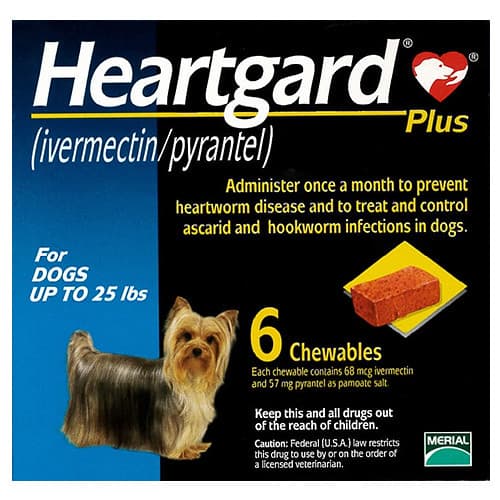
Photo Credit: by whsbio09, flickr.com
Ivermectin is medication used for treatment of parasites in animals. It is grouped with some other similar drugs under the class of macrocyclic lactones, and commonly used by farm animal and domestic animal veterinarians to treat all manner of external and internal parasites in dogs, cats, cattle, pigs, and horses. Nevertheless, it is commonly used ‘off-label’ or ‘extra-label’ in other species as well, such as other farm animals, rabbits, and guinea pigs.
What is Ivermectin Used for in Pets?
Ivermectin is a versatile antiparasitic medication for animals. In pets, internal parasites such as hookworms, roundworms and Capillaria are typically treated with it, and external parasites, such as demodex mites, scabies mites and ear mites are often effectively managed and eliminated with its use.
Nevertheless, one of the most common uses for ivermectin is the prevention of dog and cat heartworm in the United States and warmer regions of Canada.
Heartworm is a roundworm known as Dirofilaria. It is spread through the bites of mosquitoes, where it enters the blood and travels to the heart and lung vessels. If left untreated, heartworm infections can lead to congestive heart failure and death. Nevertheless, products are available which can be administered monthly to your pet to prevent heartworm disease.
What Presentations of Ivermectin are Available?
Ivermectin is available for animal use in many forms: tablets, chewable treats, topical liquid applications, and injectable forms. Your veterinarian will determine which one is the most suitable for your pet’s ailments.
Here at Canadian Pharmacy King, we stock Heartgard Dog Plus chewable tablets for the prevention of heartworm in dogs. It is combined with pyrantel, which is also effective for protection against hookworm and roundworm infections.
Heartgard Dog Plus tablets are available in three sizes (<11kg, 12-22kg and 23-45kg), depending on the bodyweight of your dog, and come in a pack of six chews, suitable for six monthly preventative treatments.

Photo Credit: by Alice Ortice, flickr.com
Canadian Pharmacy King also offers ivermectin in the form of a 1%/30g or 1%/60g cream (Rosiver or Soolatra) or 3mg, 6mg or 12mg tablets (Stromectol or generic), however, these are not veterinary preparations, and are only available ‘off-label’ with a prescription from a veterinarian.
Other veterinary forms of ivermectin, such as injectable or topical liquid applications, are not currently available at Canadian Pharmacy King.
How to Give Ivermectin
Ivermectin should be given by following the directions of your prescribing veterinarian. There are many different types of ivermectin application and treatments available, so it is important to follow the directions exactly.
Ivermectin can be given with or without food, however some animals may feel nauseous if given ivermectin on an empty stomach. If this is a case, offer a small amount of food next time.
If you have missed a dose of ivermectin, do not give two doses together or give an extra dose. Instead, give the dose as soon as you remember, and wait the directed amount of time between that dose and the next dose. The exception is with heartworm prevention. If it has been more than eight weeks since your dog has received a heartworm preventative treatment, contact your veterinarian for advice.
Any remainder ivermectin medications can be stored at room temperature, in a dry place, away from direct sunlight and heat.
Side Effects of Ivermectin
Ivermectin is widely used in the veterinary world, and very well tolerated, however some serious side effects can occur in certain individuals or in the case of an overdose or high prescribed doses.
Typical side effects include vomiting, diarrhea, unsteady walking, dilated pupils, depression, convulsions and hypersalivation. If your pet has a suspected adverse effect, contact your veterinarian immediately.
When Not to Give Ivermectin
Some breeds of dogs are more likely to develop side effects to ivermectin than others. These are usually herding breeds (e.g., Border Collies, Shetland Sheepdogs, Old English Sheepdogs) and is due to a genetic mutation in the MDR1 gene resulting in a decreased ability to effectively filter drugs out of the brain. As a result, they can easily build up to toxic levels.

Photo Credit: by ger power, flickr.com
MDR1 gene mutations can be tested for with DNA tests to understand whether your dog is likely to have an adverse reaction to ivermectin.
Ivermectin should also not be given to dogs under six weeks old, or dogs who may be positive for heartworm.
Finally, ivermectin can interact with other medications, such as ketoconazole, itraconazole, cyclosporine, erythromycin, amlodipine, nifedipine and spinosad, resulting in an increased chance of side effects. Therefore, it is important to make your veterinarian aware about any chronic medications, herbal therapies, or health supplements your dog is taking before ivermectin is prescribed.
Take Home Message
Ivermectin for veterinary use can be purchased with a valid veterinary prescription from Canadian Pharmacy King. We are a certified and trusted pharmacy, which provides several options for your pet’s ivermectin needs at very competitive prices.
Ivermectin should only be used in animals under the guidance of a veterinarian, and therefore it is important to follow the dosage amount and regimen as prescribed by your vet.
###
Dr Jo de Klerk graduated from the Royal Veterinary College and works as a veterinarian and writer. She has a Master's in Tropical Animal Health. Her clinical interests are pain management, rehabilitation, and community practice.